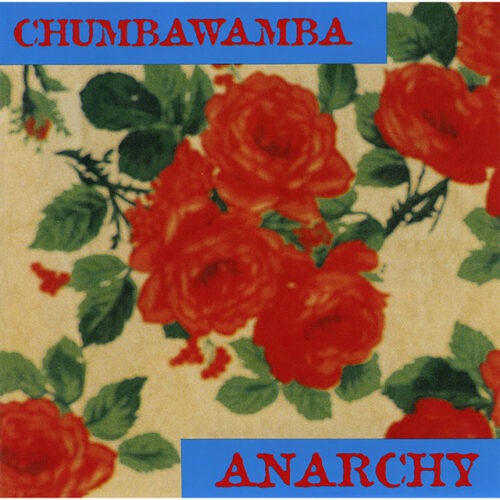HEAVY MUSIC HISTORY: Anarchy – Chumbawamba
In 1994, Britain was only just beginning to recover from the shockwaves of punk and its cultural impact when northern based CHUMBAWAMBA dropped their sixth album, which was wildly controversial for many different reasons. Aptly named Anarchy, the album defied all rules of the music industry from the beginning, most notably with its cover, a graphic but unashamed depiction of a woman giving birth. While the band likely did this to demonstrate their unabashed and progressive viewpoints, and exercise their right to free speech with some level of shock value, this didn’t go down well with the general public, inspiring various outcries. Even thirty years on it continues to be censored, with Spotify and other outlets displaying an alternate cover. The album itself continues with this unapologetic theme, following in the footsteps of the British punk bands that inspired them, and broaches many political themes, making their stand on the opinions that were important to them.
Before Anarchy, the band had been making music for ten years, and quickly expanded, welcoming vocalists Alice Nutter and Dunstan Bruce. Their foundations come from squat culture, and drew a lot of inspiration from anarcho-punk band CRASS. Throughout the 80s, CHUMBAWAMBA were extremely impactful in the punk scene, with their distinctive sound and consistent political effort, often playing benefit shows for animal rights and the anti-war movement. While they were steadily gaining popularity in the scene, by their sixth effort, they seemed to skyrocket, which could be contributed to its slightly more palatable sound. Although it was their first album to enter the UK’s top 30 chart, there was definitely push-back, mainly due to the cover, with many record shops either refusing to stock Anarchy, or hiding it in plain sleeves. With fans of the band though, Anarchy was extremely successful, with the band continuing to play many of the songs live until they disbanded in 2012. For British punk music, Anarchy represented a breath of fresh air, a genre that was slowly being overtaken by newer, different sounds. While still maintaining punk’s core values, Anarchy gave new life to the sound, blending influences of rap, pop and techno, in an album that is undeniably catchy.
Opening with the aptly named Give The Anarchist A Cigarette, CHUMBAWAMBA’s distinctive sound is demonstrated, and what sets them apart is the difference between Nutter’s melodic and gentle vocals detailing the fundamentals of anarchy, with Bruce’s aggressive adlibs bringing the satire. Probably one of the most memorable tracks from Anarchy is Timebomb, detailing the bands growing frustration with the current political climate, and the slightly teasing promise that a revolution is pending, cemented by its last line, “Stop now, what’s that sound, London Bridge is falling down.” While the song isn’t brazenly political or rousing, it’s catchy, unobtrusive sound in comparison to the underlying meaning is something the band do really well, and even in their less activist songs, they maintain their moral standpoints. It’s impossible to discuss Anarchy without including Homophobia, as it is such a haunting song that stays with you after just one listen. In 1994, homophobia was rife in Britain, with the AIDS epidemic clouding the general public’s understanding of what it meant to be queer and, while it was slowly improving, gay people faced ridicule and violence daily. While CHUMBAWAMBA were no strangers to releasing controversial songs, the graphic nature and unashamed stance of Homophobia no doubt would have caused much conversation and push-back at the time. The song seemed to have two sides to it: its brutal verses designed to generate shock, disgust and sympathy, and it’s simple chorus, with the lyrics, “Homophobia, the worst disease, you can’t love who you want to love in times like these.” Ultimately, the song is a sad but necessary one, and listening back thirty years later, it’s a relief that times have changed somewhat for the better, although that isn’t to say it shouldn’t still be mandatory listening for some people.
Another favourite from Anarchy is Heaven-Hell, with a background of techno beats overlaid with Nutter’s beautiful but haunting vocals, the songs has its own entirely unique sound, with lyrics you can’t help but think about long after listening. Love Me, with vocals mainly from Bruce, is a dig at Bono, and his character which can be seen to parody political struggle, but more widely at popstars who are worshipped by fans, but may not deserve it. Georgina is an eerie retelling of the film The Cook, The Thief, His Wife And Her Lover, but is often seen as an allegory of British politics and class oppression. While some elements of Anarchy are deeply serious, CHUMBAWAMBA also demonstrate a light hearted, satirical attitude in various songs, and Mouthful Of Shit and Bad Dog are perfect examples. Closing with Enough Is Enough, listeners are harshly reminded of the message of the album, with the repeated lyrics of, “Open your eyes, time to wake up, enough is enough, give the fascist man a gunshot.”
Commercially, Anarchy was fairly successful despite its punk origins, bringing the band their debut to the UK charts. Additionally, it was a hit with their fans, and is much loved thirty years on. Critically though, the album didn’t do so well, with various publications rating it extremely harshly. It was the general consensus that the music press didn’t like them, much like other bands of their genre. Notably, Select rated it a 2 out of 5, and stated it was, “disappointingly uninspired, petty rather than poignant and flooded with lame clichés and, for the most part, feeble subjects.” Despite this, it can surely be agreed releasing such an experimental album with such strong statements in that turbulent political climate, is something to be praised and commended.
Later on, CHUMBAWAMBA would skyrocket to fame with their commercially successful single Tubthumping, but many of their listeners would believe, even now, that Anarchy is their most impactful work, and easily a fan favourite.

Anarchy was originally released on April 25, 1994 via London Records.


Watts provides the vocals for Heaven/Hell, not Nutter. NoBacon provides the vocals for Love Me, not Bruce